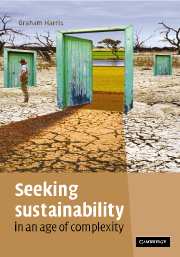Book contents
- Frontmatter
- Contents
- Acknowledgements
- 1 Preamble: the world we are in
- 2 Complexity and complex systems
- 3 New science, new tools, new challenges
- 4 The complexity of ecology
- 5 The generation of complexity
- 6 Micro-interactions and macro-constraints
- 7 A sense of place
- 8 Created landscapes and our changing sense of place
- 9 Catchment form and function
- 10 Catchment loads: ecosystem impacts
- 11 Change detection, monitoring and prediction
- 12 Evidence, uncertainty and risk
- 13 Modified landscapes: biodiversity
- 14 Function in fragmented landscapes
- 15 Environmental flows
- 16 Evidence for global change
- 17 Values and beliefs
- 18 Managing environmental, social and economic systems
- 19 Linking multiple capitals in a changing world
- 20 Community, capacity, collaboration and innovation
- 21 A new environmental paradigm
- 22 Emergent problems and emerging solutions: developing an ‘ecolophysics’?
- 23 Avoiding collapse
- Index
7 - A sense of place
Published online by Cambridge University Press: 21 March 2011
- Frontmatter
- Contents
- Acknowledgements
- 1 Preamble: the world we are in
- 2 Complexity and complex systems
- 3 New science, new tools, new challenges
- 4 The complexity of ecology
- 5 The generation of complexity
- 6 Micro-interactions and macro-constraints
- 7 A sense of place
- 8 Created landscapes and our changing sense of place
- 9 Catchment form and function
- 10 Catchment loads: ecosystem impacts
- 11 Change detection, monitoring and prediction
- 12 Evidence, uncertainty and risk
- 13 Modified landscapes: biodiversity
- 14 Function in fragmented landscapes
- 15 Environmental flows
- 16 Evidence for global change
- 17 Values and beliefs
- 18 Managing environmental, social and economic systems
- 19 Linking multiple capitals in a changing world
- 20 Community, capacity, collaboration and innovation
- 21 A new environmental paradigm
- 22 Emergent problems and emerging solutions: developing an ‘ecolophysics’?
- 23 Avoiding collapse
- Index
Summary
The anthropocentric view of landscape: historical and cultural overtones
All of us have a deep sense of ‘place’ built around landscape, ecology and biogeography. Something deep in the human psyche identifies with particular aspects of landscape; not just the obvious ‘look and feel’ but also very subtle features of the light, the sounds and the smell. What we see and feel is an emergent whole, the product of many interacting aspects of pattern and process ranging over many time and space scales. All of us carry culturally determined values and a deep familiarity with a set of signs and symbols – with a set of semiotics. In many cases this is a reflection of the environment in which we grew up; there are evidently many early influences on our sense of place. Whatever the reason, whether learned or more deeply engrained, a sense of place is important to all of us and we build mental and landscape models of our preferences through culture, art, architecture, agriculture and urban planning and development. All around the world as development proceeds we simply make the landscape conform to our sense of place and values.
Dustin Penn has written a long piece on the use of evolutionary explanations of the present environmental crisis. He argues that the human species has a long history of causing environmental problems. The ‘Noble Savage’ was no more sustainable than we are now; there were just fewer of us and we had less technological power and assistance.
- Type
- Chapter
- Information
- Seeking Sustainability in an Age of Complexity , pp. 83 - 100Publisher: Cambridge University PressPrint publication year: 2007



